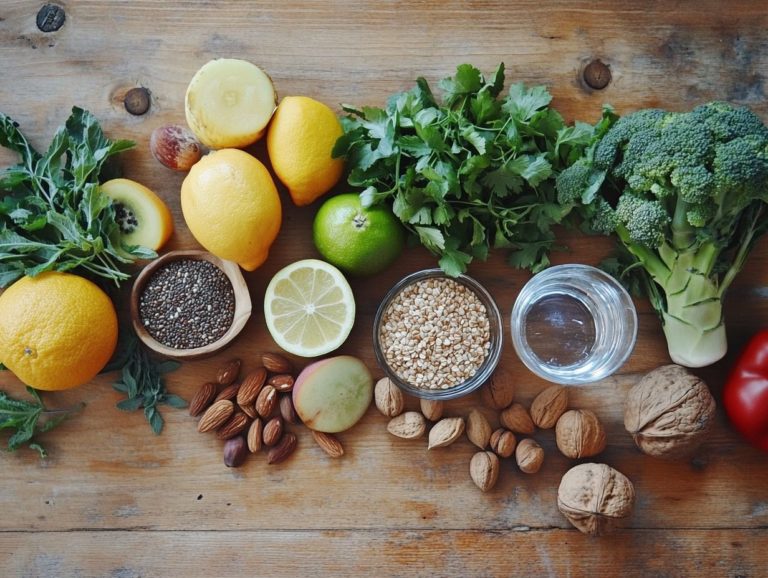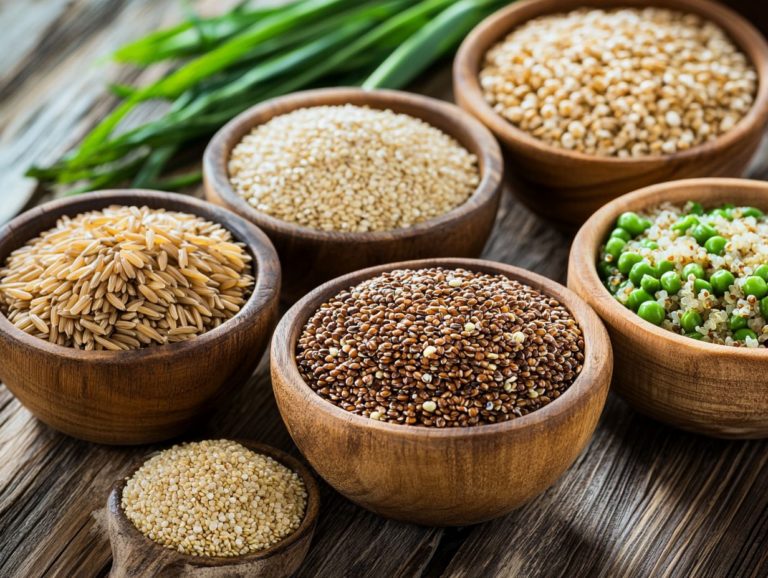Holistic Nutrition: A Path to Better Digestion
Holistic nutrition highlights the profound interconnectedness of your body, mind, and spirit, especially regarding digestion.
Recognizing how digestive health influences your overall well-being is essential for achieving a harmonious balance in life. In this article, you’ll discover the realm of holistic nutrition, the significant role digestion plays in your health, common digestive issues, and effective strategies to enhance gut function.
By embracing dietary changes, making thoughtful lifestyle adjustments, and nurturing the mind-gut connection, you can uncover pathways to elevate your digestive health, paving the way for a more vibrant and fulfilling life.
Contents
- Key Takeaways:
- Understanding Holistic Nutrition
- The Role of Digestion in Holistic Nutrition
- Common Digestive Issues and Their Causes
- Holistic Nutrition Approaches to Improve Digestion
- Lifestyle Factors for Optimal Digestion
- Integrating Mind and Body for Better Digestive Health
- Frequently Asked Questions
- What is holistic nutrition and how does it improve digestion?
- What are the main principles of holistic nutrition?
- Can holistic nutrition help with digestive issues?
- What are some common foods that can improve digestion?
- Is there a specific diet to follow for holistic nutrition?
- Can holistic nutrition benefit overall health in addition to digestion?
Key Takeaways:

Holistic nutrition is an approach that considers the whole person and their unique needs for optimal digestion and overall health. Digestion plays a critical role in this practice, as it impacts the absorption and utilization of essential nutrients for our body’s functions. By addressing imbalances in digestion through dietary changes, supplements, stress management, and exercise, we can achieve better gut health and overall well-being, as outlined in holistic nutrition: balancing mind and body.
Understanding Holistic Nutrition
Understanding holistic nutrition requires a comprehensive approach to health that weaves together various aspects of well-being. It places strong emphasis on gut health, digestive wellness, and understanding food sensitivities and holistic nutrition as a solid foundation of nutrition knowledge.
Embracing holistic nutrition encourages you to favor whole foods such as vibrant fruits, fresh vegetables, and fermented foods to nurture a healthy community of bacteria in your gut. It also addresses specific conditions like Irritable Bowel Syndrome (IBS) and highlights naturopathy’s role in managing digestive issues while aiming to reduce inflammation.
Nutrition experts, such as Elissa Goodman, highlight the critical importance of nutrient absorption through mindful eating and a balanced diet. This practice can profoundly enhance your quality of life and overall wellness.
Defining the Concept
Holistic nutrition embraces a health approach that considers you as a whole person body, mind, and spirit rather than merely focusing on isolated symptoms or issues. It underscores the significance of a balanced lifestyle, acknowledging that what you eat influences not just your physical health but also your emotional and mental well-being.
This holistic view differs greatly from conventional nutrition, which often zeroes in on specific dietary concerns and tends to elevate isolated nutrients or quick fixes.
Holistic nutrition champions the benefits of nutrient-dense whole foods such as leafy greens, whole grains, nuts, seeds, and fermented foods that nurture your digestive health, aligning with principles found in naturopathy: a holistic path to healing.
These foods are brimming with vitamins, minerals, and probiotics, bolstering your gut health, enhancing your immune function, and promoting emotional resilience. Embracing this philosophy can transform the way you view food and its role in your overall wellness.
The Role of Digestion in Holistic Nutrition
Digestion is fundamental to holistic nutrition, intricately linked to gut health, nutrient absorption, and your overall well-being—critical components of a vibrant lifestyle.
When digestion operates smoothly, your body skillfully breaks down food into essential nutrients. However, imbalances from conditions like IBS can disrupt this process and trigger a cascade of health concerns.
Integrating digestive enzymes can significantly boost your digestive health, increasing your body’s capacity to absorb vital nutrients.
How Digestion Affects Overall Health
The process of digestion significantly impacts your overall health by influencing the community of bacteria in your gut, which plays a crucial role in nutrient absorption and can affect conditions like IBS. A well-balanced gut microbiome is essential for breaking down food effectively, enabling your body to extract vital nutrients from your diet.
This delicate ecosystem also acts as a barrier against harmful pathogens, reducing the risk of inflammation and digestive disorders. If you re experiencing symptoms like bloating or discomfort, prioritizing your digestive health can lead to substantial relief.
By nurturing a thriving community of beneficial bacteria through your diet such as fiber-rich foods and probiotics you may notice improved digestion and, as a delightful bonus, enhanced overall wellness.
Start exploring these food choices today!
Common Digestive Issues and Their Causes

Common digestive issues such as irritable bowel syndrome, constipation, and lactose intolerance frequently stem from your dietary choices and lifestyle factors. This includes the importance of managing stress and reducing inflammation in your daily life.
Identifying and Addressing Imbalances
Identifying and addressing imbalances in your digestive health is crucial for managing issues like IBS. Keeping a food diary can be a game changer, helping you pinpoint triggers.
Recognizing symptoms like bloating, gas, or irregular bowel movements provides valuable insight into underlying issues. By employing simple techniques like mindful eating, you will supercharge your gut health!
Incorporating fiber-rich foods into your diet enhances gut function. Probiotics are essential for balancing gut bacteria and may alleviate symptoms of digestive distress.
Integrating fermented foods or high-quality supplements into your routine creates a healthier digestive environment. Gradual dietary changes lead to lasting results, ensuring that your digestive health improves sustainably.
Holistic Nutrition Approaches to Improve Digestion
Holistic nutrition approaches enhance digestion by focusing on dietary transformations that emphasize whole foods, alongside the strategic use of supplements such as probiotics and digestive enzymes. For more insights on this topic, check out holistic nutrition: what you need to know. By embracing these methods, you nurture your digestive system and elevate your overall well-being.
Dietary Changes and Supplements
Incorporating dietary changes and supplements like probiotics and digestive enzymes can truly elevate your digestive health. These adjustments involve a greater focus on whole foods, which are abundant in fiber and essential nutrients crucial for maintaining gut balance.
Foods such as avocados, loaded with healthy fats, and fibrous vegetables like broccoli encourage regular bowel movements and nourish beneficial gut bacteria. Including fermented foods like yogurt and sauerkraut offers natural sources of probiotics, supporting a thriving community of beneficial bacteria in your gut.
Adding digestive enzymes through supplements can greatly help if you have specific sensitivities. They enable you to break down complex foods more effectively. Emphasize hydration by incorporating water-rich fruits like watermelon; they’ll facilitate better digestion too.
These mindful choices lead to a happier, healthier digestive system!
Lifestyle Factors for Optimal Digestion
Lifestyle factors like managing stress, prioritizing hydration, and engaging in regular exercise are essential for optimal digestion. By focusing on these elements, you ensure that your body operates at its peak and maintains a healthy gut.
Stress Management and Exercise

Effective stress management and regular exercise are vital for a healthy gut and ensuring optimal digestion. In today’s fast-paced world, incorporating practical stress-relief strategies can significantly boost your well-being.
Mindfulness practices like yoga and meditation boost your digestive health. Engaging in regular physical activities like walking, cycling, or swimming stimulates your intestinal function and improves gut flora.
Specific exercises, like gentle twists and deep stretching, aid digestion by enhancing circulation and alleviating bloating. Together, these approaches create a harmonious connection between your mind and body, ultimately supporting a healthier digestive system.
Integrating Mind and Body for Better Digestive Health
Integrating the mind and body is essential for enhancing your digestive health. Embracing practices such as mindful eating and effective stress management can significantly elevate your holistic nutrition journey.
These practices lead to remarkable improvements in your overall well-being.
Conclusion
To summarize, focusing on dietary changes, lifestyle factors, and the science behind holistic nutrition can dramatically improve your digestive health. Start today by trying a new recipe rich in whole foods or incorporating a mindfulness practice into your routine!
The Mind-Gut Connection
The mind-gut connection is a fascinating relationship between your mind and gut health. What happens in your mind can directly affect how well you digest food.
For example, stress can cause digestive issues like bloating and irritable bowel syndrome. This shows how important it is to keep your emotions in check.
Your gut health plays a vital role in your emotional well-being. An unhealthy gut can lead to feelings of anxiety and depression.
Understanding this connection helps you manage stress more effectively. It also highlights the importance of caring for both your mental and digestive health.
Frequently Asked Questions
What is holistic nutrition and how does it improve digestion?
Holistic nutrition focuses on the whole person mind, body, and spirit. It encourages eating whole, nutrient-rich foods for better digestion and health.
What are the main principles of holistic nutrition?

The main ideas in holistic nutrition include eating whole foods, choosing nutrient-dense options over calorie-counting, and listening to your body. It’s also important to incorporate mindfulness into your eating habits.
Can holistic nutrition help with digestive issues?
Yes, it can greatly improve issues like bloating, constipation, and acid reflux. By focusing on whole foods and practicing mindfulness, you can support a healthier gut.
What are some common foods that can improve digestion?
Foods rich in probiotics, prebiotics, and fiber are fantastic for digestion. This includes fermented foods like kimchi and yogurt, as well as high-fiber fruits and vegetables like apples and berries.
Is there a specific diet to follow for holistic nutrition?
There isn t a one-size-fits-all diet for holistic nutrition. It s about including nutrient-dense foods and balance in your meals.
Can holistic nutrition benefit overall health in addition to digestion?
Absolutely! Holistic nutrition promotes overall well-being, positively affecting digestion, energy levels, immune system, and mental health.






